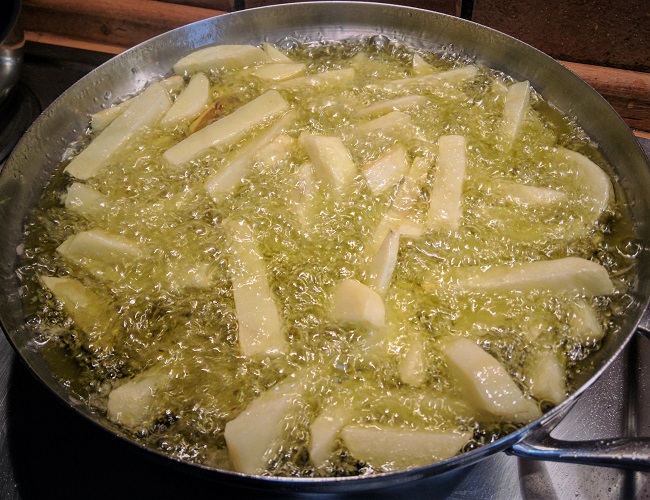Slightly soggy, not particularly crunchy olive-oil-fried potatoes, accompanied by an olive-oil-fried egg, or just yogurt, or a piece of tangy feta, was the ultimate comfort dinner for my sister and me.

Many older Greeks share the experience; I guess now pizza –ordered out or microwaved– has replaced our beloved tiganites patates (fried potatoes) which need dedicated mothers to peel, cut, and fry the potatoes from scratch, since the frozen kind was never an option…

Shallow frying any kind of vegetables, meatballs, or fish in olive oil is the tradition for home cooks around the Mediterranean. My mother was re-using the frying olive oil 2-3 times, passing it through a fine sieve after frying the potatoes. She was keeping it in a separate bottle, to have it handy for the next time she had to fry potatoes, zucchini or meatballs. Of course, after frying meatballs or fish the oil had to be discarded. My mother sometimes added pieces of dried bread or leftover rice to soak up this frying oil and feed the semi-stray cats that roamed around our vast garden in the outskirts of the city, where I grew up.
I was very pleasantly surprised when I found this humble childhood comfort food served at the prestigious Paco Meralgo tapas restaurant in Barcelona. Called “ous de pages ferrats” (meaning ‘fried farm eggs’ in Catalan) the dish was exactly like our favorite childhood dinner; only it had two, instead of just one eggs with the fried potatoes. My friend, the renowned chef and humanitarian José Andrés has demonstrated on US television his special technique for frying each egg in olive oil so that the white is cooked and firm, but the yolk stays wonderfully soft and runny.

Apparently, Catalans as all Spaniards share our affinity for olive-oil-fried eggs, as it is obvious from the famous ‘Old Woman Frying Eggs,’ Diego Velázquez’ early 17th c. painting. Like the old lady in the painting, Stelios Trilyrakis at his Dounias tavern, fries his incredible potatoes in a clay pot over live fire. No wonder people from all over the world brave the long, winding, and often harrowing road to drive to the village Drakona, high in the mountains of western Crete, not just for the potatoes but for all the delicious age-old traditional dishes Stelios prepares.

Fried potatoes are always my favorite comfort food, and when, ten years ago, my dear friend, the famous chef and author Deborah Madison asked me to send her my favorite recipe for her book ‘What we Eat when we Eat Alone,’ I described my beloved olive-oil-fried potatoes which I often accompany with a simple sauce of yogurt with some spicy Dijon mustard these days; my deep-flavored fried eggs, usually from our neighbor’s hens, I prefer to enjoy with toasted slices of my home-made bread.
Read More










 This is the soup I make often varying the ingredients slightly –with more onion or leek, sometimes adding chopped, dried mushrooms instead of the chicken broth. The topping also may vary; once I made a kind of caper-scallion-chard pesto instead of the fried peas.
This is the soup I make often varying the ingredients slightly –with more onion or leek, sometimes adding chopped, dried mushrooms instead of the chicken broth. The topping also may vary; once I made a kind of caper-scallion-chard pesto instead of the fried peas.